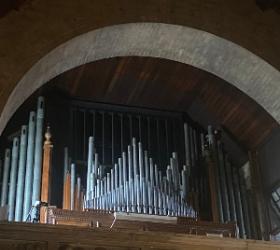
The 24th International Organ and Church Music Institute, directed by Marilyn Mason and held on the University of Michigan campus June 23-25, 2003, was a time of summer friendship, fun, and fundamentals. The presenters offered helpful, in-depth presentations of their topics. In the evenings, four graduate recitals were performed by Joseph Daniel, Abigail Woods, David Saunders (with lecture), and David Troiano.
Josef Kotowicz played several examples of early Polish organ music, originally notated in tabulatura, noting that the forms of organ writing existed in Poland before Buxtehude and prior to Bach. He presented a picture of Polish organ music as paralleling that of Europe, both in the knowledge of the major international composers and in composing native pieces, though these are sometimes found as anonymous.
In the second lecture, Kotowicz took us through the 19th- and 20th-century trends in Polish organ building and playing which followed the general European trends, especially in regard to building practices (the Romantic and organ reform aesthetic), stamped with the character of Roman Catholic liturgical practice and the ensuing wars and occupations. With Poland being the battleground of two world wars, it is remarkable that some historic organs have survived. A brochure with valuable and interesting photos of surviving historic organs was provided to the participants as well as copies of the early pieces.
Bess Hieronymous stressed the importance of musicology as she recounted Mozart’s many experiences with the church organ, the mechanical clock organs, his excellent playing, and his never being employed as church organist. He quite favored the organ for its voluminous tone and full sound. Hieronymous emphasized the historical background of times and trends, insisting on not always playing the style in a certain right way. The classic tradition of organ playing was on the wane in Mozart’s time. The mechanical clock flute organ was not to Mozart’s liking, but the needed commissions compelled him to write for it. N. Seth Nelson, graduate student and former pupil of Hieronymous, smartly played K. 594, K. 616, and K. 606 during the two lectures.
David Schober gave an insightful look at Le Banquet Celeste and the octotonic scale as one modal basis of the composition of Olivier Messiaen. Michele Johns (organ) and violinist Tapani Yrojölä compared notes on repertory, logistics, and preparations of organists and instrumentalists in performance together. Helmut Schick shared from his physics background the internal and external tonal properties of the organ from both a theoretical and practical aspect. He made reference to stylistic need in organ building based on acoustics and gave illustrations with drawings, historic examples, and his own experiences as a technician. James Wagner explicated the prayerful gestures in the symbols of Bach’s writing in the examples found in the Clavierübung.
The recitals covered a gamut of literature from the early music of Spain and of Holland to recent works by Petr Eben and Ralph Simpson, all played at the Fisk organ in the Blanche Anderson Moore Hall.




